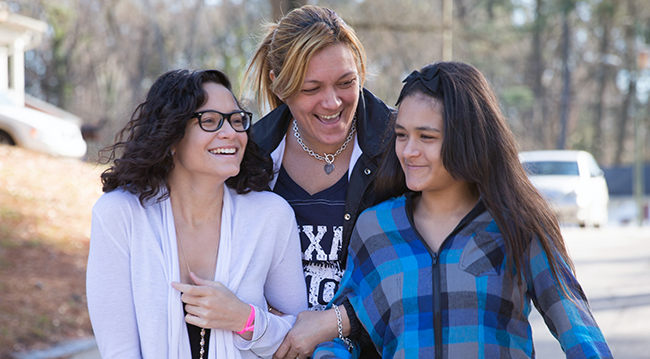Surprising Stats on Habitat Homeowners

A recent survey uncovers the wide-ranging power of home ownership in the state of Georgia
Habitat for Humanity is one of the most trusted names in the world. Independent affiliates of the international non-profit help build homes for families who don’t qualify for conventional loans but who can meet monthly payments on non-profit, zero-interest mortgages.
Although local affiliates have long seen first-hand how home ownership improves the lives of individuals and families, Habitat for Humanity of Georgia wanted more than just anecdotal analysis. So they asked the Georgia Tech Center for Economic Development Research (CEDR) to help design and execute a survey in the fall of 2016 to discover how Habitat homes affect the lives of their new owners.
The results were eye-opening, even for some long time veterans of the organization. “The numbers just blew me away,” said Athens Area Habitat executive director Spencer Frye. “The impact on parents and kids, this was something I had known from my own experience, but to see that impact statewide, it really brought the message home [of] how important our programs are to families on the cusp, where it can break either way for them depending on the opportunities they’re offered.”
The CEDR surveyed hundreds of Habitat home owners throughout Georgia, asking them about their lives before and after home ownership. For the great majority, it turns out that owning a home generates greater financial security, less reliance on government assistance, improved family relationships, strengthened community engagement, and increased feelings of personal well being and safety.
Financial security
When a family is introduced to housing stability, they are also introduced to financial stability. The majority of participants say they have more money since becoming a Habitat homeowner, and four out of five say they feel more financially secure. Seventy-four percent of homeowners are better able to save money since purchasing their Habitat home, and approximately 71 percent say they’re better able to pay bills on time.
Self reliance
Before moving into their Habitat homes, a majority of participants used some form of public or government assistance. But that number was reduced by 1/3 post-ownership. Of the homeowners who still received assistance, nearly 70 percent say their reliance on government programs has been reduced since purchasing their Habitat home.
Habitat homeowners reported decreased usage in nearly all types of assistance programs. Government funded healthcare programs and assistance with purchasing food were the two most common programs used, and they saw the largest percentage point decrease in usage. One homeowner said she had a “much easier life with having a home for [my] children. It has also provided for the ability to plan for the financial future of the family.”
Quality of Life
Home ownership can even affect a resident’s physical health. For example, the study found that nearly 50 percent of residents who use rescue inhalers actually needed the inhaler less often since moving into their Habitat home. But beyond this, homeowners saw huge improvements in their mental health and family relationships.
Nearly all homeowners (98 percent) feel positive about the future, and 79 percent say their feelings about the future have gotten better since moving into their Habitat home.
Respondents who were unable to make time to be with their family before purchasing their Habitat home now have quality family time after moving in. Homeowners feel that their families get along even better since they have moved into their Habitat home, with 77 percent of respondents saying their family gets along “very well” now.
Two thirds of homeowners say their feelings about themselves have improved since becoming a Habitat homeowner. As one owner put it, “Having my own home has lifted my hopes, and has made me feel more like an equal member of the community. It has allowed me to feel accomplished and has built my confidence.”
Below is a word cloud showing the most common ways homeowners described how they feel now that they own a home, with the most common responses being the largest.

Education and community
These positive outcomes of home ownership are only meaningful if they are sustainable. We can predict the longevity of these benefits by looking at how home ownership affects access to education and community engagement.
Of the respondents who noticed a change in their children’s study habits, 90 percent felt the change was positive. Seventy-four percent of respondents feel confident about funding their children’s college education, with three in five saying their level of confidence has increased since moving into their Habitat home.
But it’s not only the kids who benefit. Forty-three percent of respondents have started or completed higher education or training programs since becoming a Habitat homeowner, and 58 percent indicated that other adults living with them started or completed an educational or training program since moving as well.
Four out of five respondents indicate that they feel connected to their community, with about half saying they have increased their level of community involvement since purchasing their Habitat home.
Strength in numbers
The results from this study confirm that the Habitat mortgage model helps revitalize neighborhoods and strengthen families. The success of this program is due to the incredible efforts from volunteers, sponsors, staff, boards of directors, and of course the homeowners themselves.
When future homeowners agree to partner with Habitat for Humanity, they are partnering by extension with a wide community of supporters. And they are taking their future into their own hands. For many families in Georgia, all it takes is a little opportunity.
